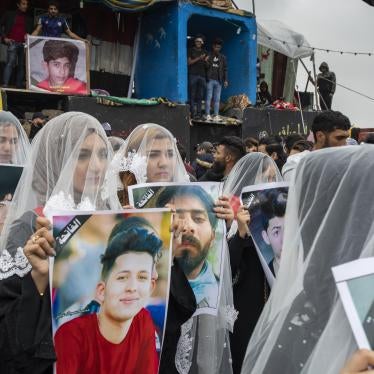(New York) - Member states of the United Nations should use President Mahmoud Ahmadinejad's upcoming visit to the UN General Assembly to address Iran's worsening human rights crisis, the International Campaign for Human Rights in Iran and Human Rights Watch said today.
The two organizations have documented extensive violations committed by state-sponsored forces since the June 12 presidential election, including unlawful use of lethal force against peaceful protesters, lengthy solitary confinement, and coerced confessions. There have also been numerous allegations of torture and rape of detainees. The two rights groups urged the General Assembly to appoint a special envoy during its 64th session to investigate and document human rights violations in Iran.
"UN member states, meeting as the General Assembly, have a responsibility to uphold UN human rights principles and demand that Iran stop these grave violations," said Joe Stork, deputy Middle East and North Africa director at Human Rights Watch. "The international community's voice, heard through the UN, can make a big difference in bringing an end to this crisis."
In the aftermath of the disputed election, hundreds of thousands of Iranians publicly protested what they said was massive fraud in counting the ballots. These protests were numerous and largely peaceful. On June 19, Iran's leader, Ayatollah Syed Ali Khamenei, who as the commander in chief is responsible for the actions of the security forces, the Revolutionary Guards, and the Basij militia, threatened the protesters with use of force if they did not end their demonstrations.
Over the following days, government forces confronted demonstrators with excessive and sometimes lethal force, leading to dozens of deaths, hundreds of injuries and numerous arbitrary detentions. The government has recently publicized mass trials in which prominent reformists and others read confessions that bore every sign of being coerced.
The International Campaign for Human Rights in Iran is releasing a new 14-page report on September 21, "Accelerating Slide into Dictatorship," detailing many serious human rights violations, including murder, torture, and rape of detainees, as well as violations of the right to freedom of association and freedom of assembly, arbitrary arrests, "disappearances," incommunicado detentions, unfair trials, and disregard for due process.
"Despite the government's tightening grip and resort to brutality, responsible members of Iran's civil society and political and clerical communities continue to demand the authorities respect fundamental rights and Iran's international obligations, at grave risk to their own well-being," said Hadi Ghaemi, director of the International Campaign for Human Rights in Iran. "Member states of the United Nations should honor the courage of Iran's citizens by appointing a special envoy."
Since June, more than 4,000 people have been detained, including at least 250 prominent political figures, journalists, professors, student leaders, and human rights defenders. Nearly 400 people are still in detention months later.
The International Campaign for Human Rights in Iran and Human Rights Watch said the government is covering up deaths in detention by forcing families to claim their loved ones died of natural causes. Both organizations have collected accounts from victims' families that government agents have exerted tremendous pressure on them not to publicize the deaths of their children.
The father of a victim who was shot and killed by security forces during a demonstration, and who wished to remain anonymous, told Human Rights Watch:
"When I insisted to security authorities who turned over the body of my son to tell me the reason for my son's death and how he was killed, they forbade me from doing any media interviews, saying it will endanger my family. They threatened me further by saying if I pursue the matter my other son's life will be in danger. They also forbade us from holding a memorial service."
A 24-year-old Iranian, Ebrahim Sharifi, was detained on June 22 by plainclothes agents for one week. He provided detailed testimony to the campaign regarding his torture and rape during detention. He said he was subjected to severe beatings, mock executions, and sexual assault. When he attempted to file a judicial complaint and told several judicial authorities what happened, intelligence agents threatened him and his family, forcing him into hiding. Sharifi's full account is detailed in "Accelerating Slide into Dictatorship."
The opposition campaigns of Mir-Hussein Mousavi and Mehdi Karroubi have published the names of at least 72 people who they allege have been killed by security forces. Because of extreme restrictions imposed on and threats against human rights defenders and families of the victims, international organizations have not been able to confirm the names of those killed. Medical sources at three hospitals in Tehran told the campaign that 34 dead bodies were taken to these hospitals on June 20 alone. The government claims that only 30 people died during the unrest.
Iranian authorities are doing all they can to prevent word of these grave rights violations from reaching Iranians and the outside world. On September 7, security forces attacked the office of the Mousavi campaign, where the Committee to Investigate the Situation of Detainees collects, documents, and disseminates information about those who were detained and injured during the recent incidents. On September 8, government agents searched the offices of Karroubi's party, Etemaad Melli, taking all documents, films, CDs, and computers. Government agents have closed both offices. Also on September 8, authorities shut the office of the Association to Defend Prisoners Rights, a nongovernmental organization founded by leading human rights defender Emad Baghi.
No independent international human rights organization has been allowed to work inside Iran. Iranian human rights organizations have been either shut down or face constant threats and intimidation. UN human rights experts have repeatedly requested to travel to the country, but the government has denied their requests.
Given the lack of access to Iran, the urgency of the ongoing human rights crisis, the International Campaign for Human Rights in Iran and Human Rights Watch urged the General Assembly to take resolute action by appointing a special envoy.





